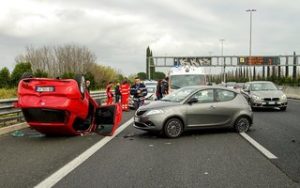At Fault Car Accident & How To Deal With Insurance Claim?
Free Car Insurance Comparison
Compare Quotes From Top Companies and Save
Secured with SHA-256 Encryption
Natasha McLachlan
Content Writer
Natasha McLachlan is a writer who currently lives in Southern California. She is an alumna of California College of the Arts, where she obtained her B.A. in Writing and Literature. Her current work revolves around auto insurance guides and informational articles. She truly enjoys helping others learn more about everyday, practical matters through her work.
Content Writer
UPDATED: Jun 8, 2022
It’s all about you. We want to help you make the right coverage choices.
Advertiser Disclosure: We strive to help you make confident car insurance decisions. Comparison shopping should be easy. We are not affiliated with any one car insurance provider and cannot guarantee quotes from any single provider. Our partnerships don’t influence our content. Our opinions are our own. To compare quotes from many different companies please enter your ZIP code on this page to use the free quote tool. The more quotes you compare, the more chances to save.
Editorial Guidelines: We are a free online resource for anyone interested in learning more about car insurance. Our goal is to be an objective, third-party resource for everything car insurance-related. We update our site regularly, and all content is reviewed by car insurance experts.
UPDATED: Jun 8, 2022
It’s all about you. We want to help you make the right coverage choices.
Advertiser Disclosure: We strive to help you make confident car insurance decisions. Comparison shopping should be easy. We are not affiliated with any one car insurance provider and cannot guarantee quotes from any single provider. Our partnerships don’t influence our content. Our opinions are our own. To compare quotes from many different companies please enter your ZIP code on this page to use the free quote tool. The more quotes you compare, the more chances to save.
On This Page
There’s nothing that’s as devastating as a car accident. Moreover, being the driver at fault can be more stressing. You not only have to worry about repairing your car, but the other person’s as well. In such a scenario, many questions will run through your mind. What should I do next? Will my insurance go up? Can I make a claim even if it was my fault? This article will focus on all these queries and much more. Plus, how to deal with this situation.
What Should I Do After a Car Accident?

First and foremost, you should check if either you or the other party is safe and if either of you is injured. You should call 911 immediately. You should then exchange your details with the other driver(s) involved in the accident. Then call your insurance company immediately.
You should also know that, after an accident, honesty is the best policy. You might be tempted to pay for the damages caused to the other car if you are at fault. But, if the other party decides to sue you later, your insurer might not consider you. It’s because you would have broken up the good faith you had with your insurance company.
Compare quotes from the top car insurance companies and save!
Secured with SHA-256 Encryption
What Shouldn’t I Do?
Never flee the scene of the accident. You should never repair your car without clearing it with the insurance company. Don’t move yourself or anyone who has been injured. Always call 911 and wait for medical help.
Does an At-fault Accident Affect My Car Insurance?
There is a possibility that if you are more than 50% at fault, then your car insurance will probably go up. It will increase when you renew your policy. The insurance companies always determine the driver who is at fault. If you happen to get a traffic violation or file for a claim when you are at fault, then your insurance company can surcharge your car insurance.
The state, however, regulates how much your insurer can raise your premiums because of the accident. You can also make use of “accident forgiveness”. Most insurance companies nowadays offer it for the first and even second accident you may get. And the insurance company may also drop your rates after a certain period.
Can I Make Claim, If I was At Fault?
Now, this is a question that many at fault drivers often ask themselves. Your car insurance policy can cover you in case you cause an accident. If you purchased collision coverage, then the insurance company will repair the damages on your car. In several states, the insurance company will also cover the damages of the other party. Now, this brings about how the insurance carrier determines who is at fault.
Compare quotes from the top car insurance companies and save!
Secured with SHA-256 Encryption
How Is Fault Determined?

Different states have different definitions of fault. Determining who is at fault requires more than the evidence provided. Proving fault can either save or cost you more money. And it can also affect your insurance rates. The following helps identify who is at fault in an accident.
- The police report often helps determine who was at fault by considering factors such as driving under the influence, or a traffic violation.
- The State Laws: This is where a highway manual comes in handy. It can give you insight into some traffic laws that can get you off the hook. For instance, if you crash into a biker, The Motorcycle Safety Lawyers state there may be a law that says the biker should be some distance from you or should be wearing some clothing. It can reduce your blame from 90% to 70%.
- The No-Doubt Accident: An excellent example of such an accident is the rear end collision. The traffic laws emphasize that you should maintain a safe stopping distance with the car ahead of you. In case of such, the rear driver is always at 100% fault. However, in some cases, it might be the fault of the driver ahead. For instance, if the fault driver had broken tail lights.
Fault Vs No-Fault States
Under no-fault states, in case of an accident. Your insurance provider automatically pays for the damages irrespective of fault. However, the compensation is up to a certain limit.
In the US, there are 12 states with no-fault auto insurance systems. They are; Florida, Utah, Hawaii, Pennsylvania, Kansas, Kentucky, Michigan, Massachusetts, New Jersey, New York, Minnesota, and North Dakota.
In exchange for the compensation, you’re not allowed to sue the other driver even if he was at fault. You can only sue the other party in case of severe injuries or death results from the accident.
On the other hand, most states have adopted fault-based systems of auto insurance. It’s also known as tort liability. In this system, the insurance company pay’s according to each person’s degree of fault. If your auto insurer declines to pay for damages, you can sue the company for compensation. The fault state laws have however led to prolonged court battles in trying to determine who is at fault and who isn’t. It’s why some states opted to embrace the no-fault system.
What Happens If I am Uninsured or Underinsured?
If you are underinsured and you are at fault then you will have to dig more out of your pocket to cover the damages. It’s because your insurance coverage won’t be enough to cater for the compensation of the other party. When selecting auto insurance coverage always pick a higher limit so that you reduce your out of pocket expenses in case of an accident.
Driving without insurance is illegal in most states. If caught, you can lose your driving license, pay fines or even jail time. In case you are involved in an accident, and you are uninsured, you will have to pay for all the damage to your vehicle. Plus, the other party can sue, and the chances of you winning such a case are very slim.
Should I Admit Fault?
Whether you were at fault or not, it’s not a decision for you to make. Many people have made this mistake and admitted to something because they felt guilty at the moment. There’s a huge possibility that you might not be at fault. The other driver might be the one who has broken a traffic law. Plus, you never know what other witnesses might have seen. It’s advisable always to wait till investigations have been done.
If it turns out that you are not at fault, then you can sue the other party in a small claims court.
Finally, in case you get into an accident. Try to remain calm so that you think clearly and make a decision you won’t regret later. Accidents can be stressful, but thanks to car insurance. It can make the situation a bit easier.

Compare quotes from the top car insurance companies and save!
Secured with SHA-256 Encryption
Natasha McLachlan
Content Writer
Natasha McLachlan is a writer who currently lives in Southern California. She is an alumna of California College of the Arts, where she obtained her B.A. in Writing and Literature. Her current work revolves around auto insurance guides and informational articles. She truly enjoys helping others learn more about everyday, practical matters through her work.
Content Writer
Editorial Guidelines: We are a free online resource for anyone interested in learning more about car insurance. Our goal is to be an objective, third-party resource for everything car insurance-related. We update our site regularly, and all content is reviewed by car insurance experts.

